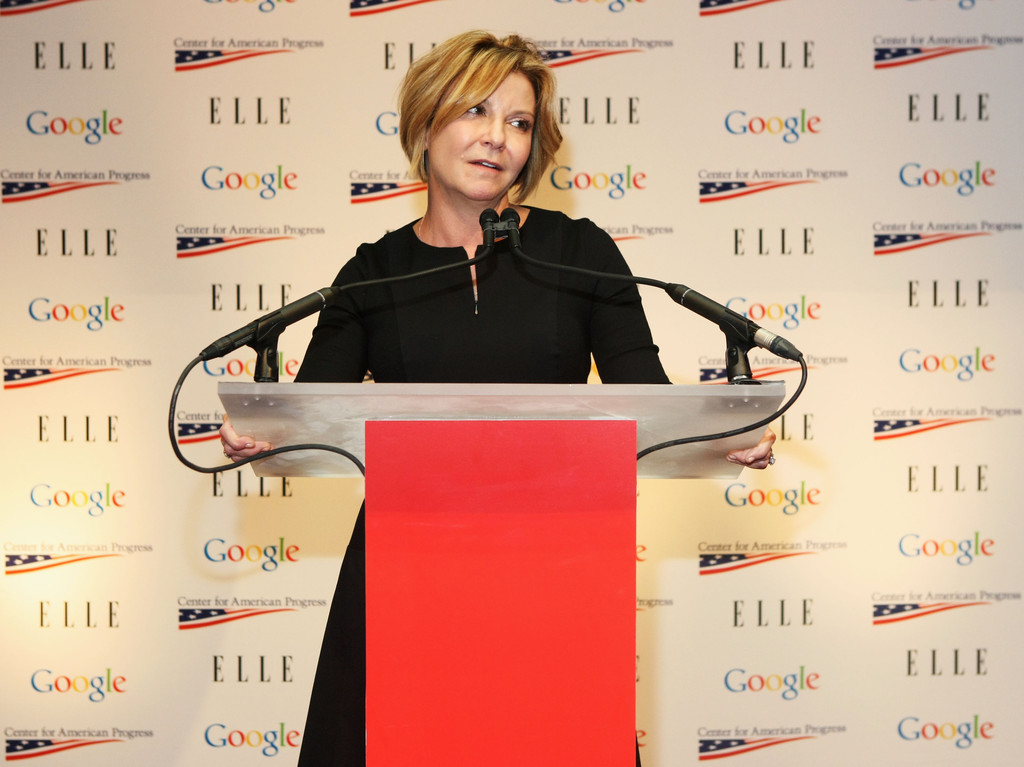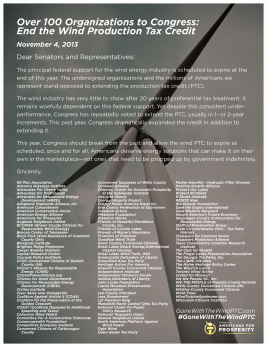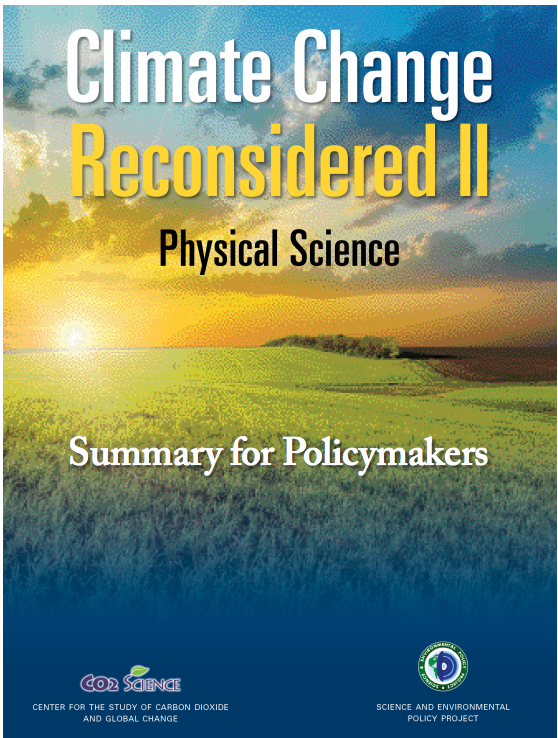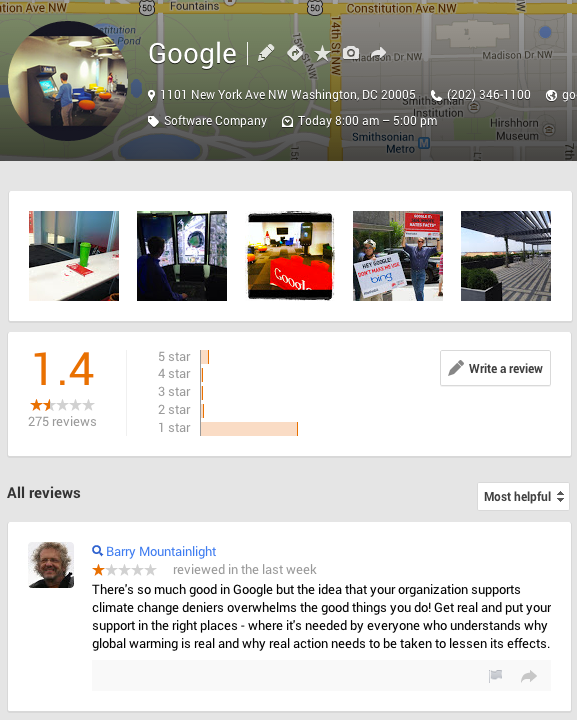Google Drops American Legislative Exchange Council Over Climate Denial: 'They're Literally Lying'
On Monday, Google chairman Eric Schmidt announced that his company has ended its support for the American Legislative Exchange Council (ALEC) because of its persistent climate-change denial. The decision came after a Schmidt made the announcement in response to a listener question on the Diane Rehm radio show.
“I think the consensus within the company was that that was some sort of mistake,” Schmidt said of Google’s support for ALEC, “and so we’re trying to not do that in the future.”
Pressed to explain further, Schmidt harshly described the conservative lobbying organization’s opposition to climate action as “really hurting our children” and “making the world a much worse place” by “literally lying.”
Well, the company has a very strong view that we should make decisions in politics based on facts — what a shock. And the facts of climate change are not in question anymore. Everyone understands climate change is occurring and the people who oppose it are really hurting our children and our grandchildren and making the world a much worse place. And so we should not be aligned with such people — they’re just, they’re just literally lying.Listen here:
ALEC president Lisa B. Nelson issued an angry press release following Schmidt’s announcement, blaming the decision on “public pressure from left-leaning individuals and organizations who intentionally confuse free market policy perspectives for climate change denial.”
Disclosure: As the campaign manager for Forecast the Facts, I founded the “Don’t Fund Evil” campaign in June 2013 challenging Google to stop funding climate-denial groups such as the Competitive Enterprise Institute and ALEC, and climate-denial politicians such as Sen. Jim Inhofe (R-Okla.) and Sen. Ted Cruz (R-Texas).
For over a year, Google representatives stonewalled over the company’s conflicting stand on climate change and its political support for climate deniers. Google’s clean-energy lead Gray Demasi had no answer for why his company supported ALEC, when I asked him at a November 2013 Greenpeace green tech event.
Now, Schmidt’s words echo an opinion piece I wrote in December 2013 on the eve of ALEC’s annual DC conference, which featured a keynote by Cruz:Unlike ALEC and Cruz, Google employees support scientific facts. Unlike ALEC and Cruz, Google employees are investing in a future powered by 100 percent renewable energy.
The “Don’t Fund Evil” call to drop ALEC was joined in December 2013 by the Sierra Club, SumOfUs, RootsAction and the Center for Media and Democracy. The coalition of climate, corporate, and good-government organizations mobilized over 230,000 citizens to petition the search giant. In addition, Google was the target of a shareholder resolution brought by Walden Asset Management challenging Google’s support for the anti-climate group.
Added pressure came in August when Google competitor Microsoft left ALEC. At the beginning of September, over 50 organizations, including several labor unions, environmental organizations, racial justice groups, and other progressive organizations signed on to a public letter asking Google to follow suit.
Google’s decision to drop ALEC is an important first step in restoring the integrity of its ‘don’t be evil’ motto. Unfortunately, the company is still financing extremist groups like the ‘CO2 Is Life’ Competitive Enterprise Institute and dozens of denier politicians. If Eric Schmidt wants to be taken seriously, he has to do a lot more cleaning up. It’s time for Susan Molinari, who pushed Google into this situation, to go.
Forecast the Facts and SumOfUs have since expanded the Don’t Fund Evil campaign into the Disrupt Denial campaign, which calls on all corporations to stop financing climate-denial politicians.
Transcript of the Diane Rehm Show:
Diane Rehm: Ok, and I think we have time for one last caller. Let’s go to Kristin in Syracuse, NY. Quick question, Kristin.Transcript of ALEC press release:Kristin: Hi, yes, thank you so much for taking my call, Diane.
D: Sure.
K: Um, I’m curious to know if Google is still supporting ALEC which is that fund, they’re, um, lobbyists in DC that are funding climate change deniers.
Eric Schmidt: Um, we funded them as part of a political campaign of something unrelated. I think the consensus within the company was that that was some sort of mistake and so we’re trying to not do that in the future.
D: And how did you get involved with them in the first place and were you, then, disappointed in what you saw?
E: Well, the company has a very strong view that we should make decisions in politics based on facts — what a shock. And the facts of climate change are not in question anymore. Everyone understands climate change is occurring and the people who oppose it are really hurting our children and our grandchildren and making the world a much worse place. And so we should not be aligned with such people — they’re just, they’re just literally lying.
“It is unfortunate to learn Google has ended its membership in the American Legislative Exchange Council as a result of public pressure from left-leaning individuals and organizations who intentionally confuse free market policy perspectives for climate change denial.“At our recent Annual Meeting in Dallas, we were pleased to host a roundtable conversation between a variety of companies—including Google—regarding renewable energy deployment and climate change. The conversations held in Dallas were intended to build understanding and pioneer future policy approaches where organizations could find common ground on issues of climate change, energy generation and government mandates. And, I personally intend to continue this work.
“In the case of energy generation, ALEC believes renewable energy should expand based on consumer demand, not as a result of a government mandate. Many misunderstand the American Legislative Exchange Council and its legislator-led, free market priorities. ALEC members believe the Federal Government exerts too much control on state and local decision-making. Google’s renewable energy commitment—as well as those found throughout private industry—is completely consistent with ALEC policy because the companies in question chose renewables absent a mandate.
“ALEC believes in freedom of speech and opinion. Google is an important voice on these and many other issues, and we will miss their perspective in our discussions. However, ALEC and its members will continue to advance limited government, free markets and federalism through dialogue, debate and model policy formulation.”
Google's Republican Lobbyists and Representatives

Google ex-McCain PR representative Niki Christoff
Starting in 2010, when the antitrust case first started appearing on the horizon, Google started hiring Republican lobbyists and communications staff.To head up its Washington office, Google in 2012 hired former Republican congresswoman Susan Molinari. Niki Christoff, a veteran of Sen. John McCain’s presidential campaign, was moved to Washington last year to head up Google’s communications in the capital.
Before that, Google hired Pablo Chavez, a former general counsel for Mr. McCain, who recently left for LinkedIn; Seth Webb, a former staffer for the Republican Speaker of the House; and Jill Hazelbaker, who also worked for a string of Republican candidates.
Today, Google’s in-house lobbyists are evenly split between Republicans and Democrats, says a person familiar with the situation.
Its spending on lobbying rose from around $1.5 million in 2007 to $14 million in 2013.
Jill Hazelbaker, Google’s head of corporate communications from 2010 to 2013, was the subject of a 2011 profile in Business Insider which explained her meteoric rise as a top member of the 2008 John McCain campaign. Hazelbaker’s early Internet politics credentials came from trolling Democrats under assumed names as a member of the Tom Kean Jr. senatorial campaign in New Jersey in 2006. In 2013, she moved to the United Kingdom to head Google’s European lobbying efforts. Her Twitter account, @jillhazelbaker, is protected.
Seth Webb was hired by Google from his Republican House staff position in 2009, when their DC operation was still primarily Democratic leaning technocrats.
Nicole “Niki” Christoff (Fenwick) was a policy liaison for the 2008 John McCain campaign, starting at McCain’s Straight Talk America in March 2006. She was previously an associate policy director at the Republican polling shop Luntz Research Companies, and worked at Baker Botts LLP in Washington, DC as a trial attorney specializing in criminal defense. Christoff graduated from Harvard Law School in 2003 and Harvard College in 2000. Her Twitter account, @nikichristoff, is protected.
The WSJ article did not mention Rachel Whetstone, Google’s senior vice president of communications and public policy since 2005, a Tory scion and one of the “100 most powerful women in Britain” in 2013. Her husband Steve Hilton was the “Rasputin-like” chief strategy advisor to prime minister David Cameron.
The WSJ reporters Thomas Catan, Brody Mullins, and Gautam Nagesh also note that Google’s contributions have shifted from majority Democratic to majority Republican:In the 2008 election cycle, Google’s political-action committee, funded by employee donations, supported Democrats, 58% to 42%, according to data from the Center for Responsive Politics. In the 2012 cycle, Republicans took a slight lead, and in the current election cycle, donations to the parties are running about even.



